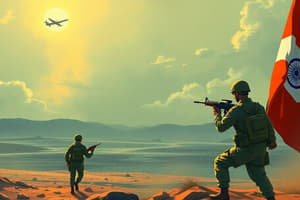Podcast
Questions and Answers
Which principle does not typically guide India's approach to bilateral relations?
Which principle does not typically guide India's approach to bilateral relations?
- Non-interference
- Peaceful coexistence
- Military dominance (correct)
- Mutual respect
What is the primary focus of India's 'Act East' policy?
What is the primary focus of India's 'Act East' policy?
- Strengthening relations with Central Asian countries
- Focusing on trade relations with European Union countries
- Enhancing economic integration with Southeast Asian countries (correct)
- Developing stronger ties with Middle Eastern nations
Which of the following best describes the current state of relations between India and China?
Which of the following best describes the current state of relations between India and China?
- Characterized by both cooperation and competition, including border disputes (correct)
- Solely cooperative, with no areas of disagreement
- Primarily focused on military alliances
- Dominated by cultural exchange programs and tourism
What is a key element of India's relationship with Russia?
What is a key element of India's relationship with Russia?
Which of the following reflects India's approach to its relationship with Afghanistan?
Which of the following reflects India's approach to its relationship with Afghanistan?
How does India utilize its diaspora in its foreign policy?
How does India utilize its diaspora in its foreign policy?
What is the main objective of India's economic diplomacy?
What is the main objective of India's economic diplomacy?
Why are relations with Myanmar particularly important to India?
Why are relations with Myanmar particularly important to India?
What is India's stance towards reforms in the UN Security Council?
What is India's stance towards reforms in the UN Security Council?
Which factor most significantly underpins the exceptionally close relationship between India and Bhutan?
Which factor most significantly underpins the exceptionally close relationship between India and Bhutan?
Flashcards
India-Pakistan Relations
India-Pakistan Relations
Relations are complex due to historical conflicts, border disputes, and cross-border terrorism. India seeks peaceful resolution through dialogue while addressing security concerns.
India-China Relations
India-China Relations
Relations involve both cooperation and competition. Increasing trade and investment occur alongside border disputes and strategic rivalry.
India-Bangladesh Relations
India-Bangladesh Relations
Characterized by extensive cooperation in trade, connectivity, water sharing, and security. India supports Bangladesh’s socio-economic development.
India-Sri Lanka Relations
India-Sri Lanka Relations
Signup and view all the flashcards
India-Bhutan Relations
India-Bhutan Relations
Signup and view all the flashcards
India-United States Relations
India-United States Relations
Signup and view all the flashcards
India-Russia Relations
India-Russia Relations
Signup and view all the flashcards
India-Japan Relations
India-Japan Relations
Signup and view all the flashcards
Economic diplomacy
Economic diplomacy
Signup and view all the flashcards
Cultural Diplomacy
Cultural Diplomacy
Signup and view all the flashcards
Study Notes
- Indian foreign policy includes an intricate network of bilateral relationships, reflecting its strategic interests, financial ties, and historical connections.
- India's strategy for bilateral relations is based on principles of peaceful coexistence, mutual respect, and non-interference.
- Key aspects involve diplomatic engagement, economic cooperation, defense partnerships, and cultural exchanges.
Relations with Neighbors
- India's foreign policy prioritizes maintaining peaceful and cooperative relations with its neighbors.
- Relations with Pakistan are complex because of historical conflicts, border disputes, and cross-border terrorism.
- India seeks peaceful resolution of all issues through dialogue while firmly addressing security concerns.
- Relations with China involve both cooperation and competition, indicated by increasing trade and investment, but also border disputes and strategic rivalry.
- India emphasizes maintaining peace and stability along the Line of Actual Control (LAC).
- Relations with Bangladesh are strong, defined by extensive cooperation in trade, connectivity, water sharing, and security.
- India supports Bangladesh’s socio-economic development.
- Relations with Nepal are traditionally close but have seen fluctuations due to political changes in Nepal and concerns over sovereignty.
- India focuses on strengthening economic ties and development cooperation.
- Relations with Sri Lanka are centered on economic cooperation, development assistance, and addressing the issues of Tamil minority rights.
- India supports reconciliation and reconstruction efforts in Sri Lanka.
- Relations with Bhutan are exceptionally close, based on mutual trust and extensive development partnership.
- India is committed to supporting Bhutan’s economic progress.
- Relations with Myanmar are important due to its strategic location, serving as a land bridge to Southeast Asia.
- India focuses on enhancing trade, investment, and security cooperation, particularly in border areas.
- Relations with Afghanistan involve development assistance and security cooperation.
- India supports a peaceful, stable, and prosperous Afghanistan.
Relations with Major Powers
- India has cultivated strategic partnerships with major global powers like the United States, Russia, the European Union, and Japan.
- Relations with the United States have deepened significantly, characterized by increasing cooperation in defense, counter-terrorism, trade, and technology.
- The U.S. recognizes India as a major defense partner.
- Relations with Russia are historically strong, with defense cooperation and energy security as key pillars.
- India continues to value Russia as a long-standing strategic partner.
- Relations with the European Union involve trade, investment, and cooperation on climate change and global issues.
- India seeks a comprehensive trade and investment agreement with the EU.
- Relations with Japan are strengthening, with focus on economic cooperation, infrastructure development, and strategic alignment in the Indo-Pacific region.
- Japan is a key partner in India's infrastructure projects, including the Dedicated Freight Corridor.
Extended Neighborhood
- India's foreign policy extends to countries in its extended neighborhood, including Central Asia, the Middle East, and Southeast Asia.
- With Central Asian countries, India focuses on enhancing connectivity, energy cooperation, and security partnerships.
- India is involved in projects like the International North-South Transport Corridor (INSTC) to improve trade routes.
- Relations with the Middle East are crucial because of energy security, trade, and the presence of a large Indian diaspora.
- India seeks to maintain stable relations with all countries in the region.
- India's "Act East" policy focuses on strengthening relations with Southeast Asian countries, enhancing economic integration, and promoting security cooperation.
- India is an active participant in regional forums like the ASEAN Regional Forum (ARF) and the East Asia Summit (EAS).
Economic Diplomacy
- Economic diplomacy is a crucial aspect of India's foreign policy, aimed at promoting trade, investment, and economic growth.
- India actively pursues bilateral and multilateral trade agreements to enhance market access for its goods and services.
- Efforts are made to attract foreign investment to support India's development goals.
- India participates in international forums like the G20 and the World Trade Organization (WTO) to promote its economic interests.
Defense and Security Cooperation
- Defense and security cooperation are important components of India's bilateral relations, especially with strategic partners.
- India engages in joint military exercises, defense technology transfers, and intelligence sharing to enhance its security capabilities.
- India works with other countries to address common security challenges such as terrorism, cyber threats, and maritime security.
Cultural Diplomacy
- Cultural diplomacy plays a significant role in fostering goodwill and strengthening people-to-people connections.
- India promotes its culture, languages, and traditions through cultural centers, exchange programs, and festivals.
- Yoga, Indian cuisine, and traditional arts are showcased to enhance India's soft power.
Diaspora Engagement
- The Indian diaspora is an important asset in India's foreign policy, serving as a bridge between India and other countries.
- India engages with the diaspora through various programs, initiatives, and consular services.
- The diaspora contributes to India's economic development through remittances, investments, and knowledge transfer.
Multilateralism
- India actively participates in multilateral forums and international organizations, such as the United Nations, to address global challenges.
- India advocates for reforms in the UN Security Council to reflect the changing geopolitical landscape.
- India contributes to international efforts on climate change, sustainable development, and global health.
Challenges and Opportunities
- India faces several challenges in its bilateral relations, including border disputes, terrorism, trade imbalances, and geopolitical competition.
- However, there are also significant opportunities for India to strengthen its partnerships, expand its economic influence, and play a greater role in global affairs.
- India's growing economy, strategic location, and democratic values position it as a key player in the international arena.
Studying That Suits You
Use AI to generate personalized quizzes and flashcards to suit your learning preferences.




